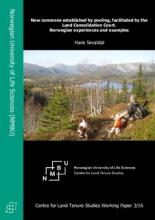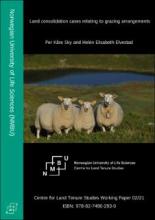/ library resources
Showing items 1 through 8 of 8.Negotiations are important in urban densification processes. In particular, integrative negotiations seem to be relevant. The conflicts between neighbors and developers can be challenging to solve.
In most countries, land consolidation was first introduced in rural areas, with legislation suitable for urban areas being drafted at a later date. This is also true of Norway. The first evidence of urban competency in the legislation is found in the Land Consolidation Act from 1950.
Paper presented at a Workshop at Universidad Publica de Navarra (Navarre Public University), Pamplona-Iruña (Spain), November 5-7, 2009.
The Land Consolidation Act has recently been revised. The changes came
into force on 1 July 2006 and 1 January 2007. The main changes in the Act are that
the land consolidation court now has formal jurisdiction to handle land consolidation
Land consolidation courts deal with cases where the relationship between holders of grazing rights needs be regulated, but also where the rights holders are competing with other potential land uses, such as building holiday cabins, forestry, hunting, etc.
The following document provides an overview of the land issues in Rwanda and the new Land
Policy and Land Law and identifies some of the key challenges for implementation, from the
perspective of the DFID appointed Land Policy Specialist to MINITERE.
Ministerial Order Determining the Modules of Land Consolidation N° 14/11.30 of 21st December 2010.
Published on the 27 December 2010.
The Land Use Consolidation Act (LUC) was introduced in 2008 and is an important
component of agricultural policy in Rwanda. As part of the Government of Rwanda’s
broader Crop Intensification Program (CIP), LUC entails participating farmers
Land Library Search
Through our robust search engine, you can search for any item of the over 73,000 highly curated resources in the Land Library.
If you would like to find an overview of what is possible, feel free to peruse the Search Guide.








